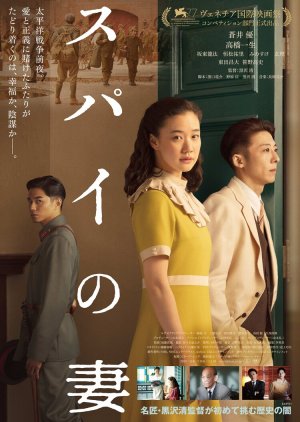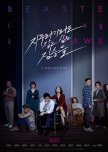Great directing and screenplay, wonderful acting
A lot of things make this movie great. The screenplay is really great and the acting and directing were also great. Aoi is a great actress and takahashi was very charismatic in this role. Loved it! I could really relate to the main character in his belief in universal justiceWell, that's all i have to say about this great film
Well, that's all i have to say about this great film
Well, that's all i have to say about this great film
Well, that's all i have to say about this great film
Was this review helpful to you?

This review may contain spoilers
find somewhere to watch this film because this is an experience none of you should miss out on.
(*vague spoilers ahead. see below.)TL;DR: Wife of a Spy is a masterpiece of a film that must be savored to be understood. it will wreck you emotionally, however, as the subject matter is heavy (though somewhat sanitized), so start this only when you're ready.
"(...) i will be insulted as the wife of a spy. is that your justice? what about our happiness?"
"happiness built upon injustice?"
"i'll still choose happiness."
"don't act like you know. you didn't see what i saw... i saw it. if i was chosen by fate, i must do something about it."
finished this film last night, had to take a moment to soak it all in and ended up rewatching the last 5 minutes at 3:00 am and sobbing bc of it. this had the honor of being one of several firsts—the first film of the year, the first title on MDL that i've given a review, the first Japanese film i've ever watched, and the first piece of Japanese media that i've watched in a long, long time (three years, to be exact, if you count the handful of anime that i attempted to complete but never did). if i ever get my hands on a dubbed version of this in Korean, despite my hatred of dubs in foreign media (i know they released this in Korea during a film festival but idk if it's subtitles only or if it's fully dubbed), i would watch it all over again bc there is something about this that i can't put my finger on but that lingers all the same, even now. hell, tbh once i've gotten confident in Japanese i'd watch it without any subtitles at all
this was,,,, a ride? i know i sh*tpost a lot on the feeds and this turn of phrase generally has a more crackhead vibe to it but this in particular is one of my more serious reviews and as such i felt this needed to be shared. it was filmed almost like a theater performance, very intimate, very bare-boned and reduced to the important details, and that served to be one of its strengths. at its core, WOAS is a story about human beings and the choices that they make when faced with something that could quite literally mean life or death, whether for them or for others like them. for Satoko, it means staying by her husband's side, even when she doesn't exactly understand his motives and it seems he has abandoned her, as poignantly seen in the last 15 minutes or so of the film. for Yusaku, it means pursuing what he believes to be justice—when the war is lost, Japan has lost, and that is best for the rest of the world, despite the deaths of his own people. for Yasuharu, it means to stay with what he finds familiar, but familiar is not always right. whether he realizes that eventually, however, we are not told. this ending, in all its vagueness, fits him, and as a result draws parallels between him and another of what i consider to be one of the most interesting (albeit non-Asian) characters i've come across to date, Rolf from The Sound of Music. the two, in both worlds, will always lose more than they have gained.
i'll be honest here and say that the first half of this film was good. not extraordinary, imo, just good. the second half, tho? sucker punch to the gut that just kept on giving, and i feel like it was bc of the actors' performance that somehow stopped being a performance and started to be LIVED. Takahashi Issei and Aoi Yū each lent their own power to this film that made it what it was—Takahashi with his portrayal of a man who lives in the blurred lines between black and white, and Aoi with her portrayal of a woman who stands in his shadow before stepping out to create her own. i can't help but feel that this film was more about her than about Takahashi, in a sense, bc even though his discovery becomes the catalyst for what follows it is her that we see when the world as we have come to know it finally crumbles, it is her grief (anger?) that we feel in its closing scenes. (also never thought hearing Aoi Yū say "i'm scared" in the smallest voice ever would break me in the beginning of the year of our Lord 2022 but congratulations, it did!) as such, it feels like a fever dream once the credits begin to roll (one that reminds me personally of the effect Mitski's music has as well), but it is one that is all too real—this, we are reminded, is based off of historical events.
eventually, this film comes full circle—whereas in the beginning Satoko is reluctant, unwilling, even, to give up what she has known for the cause that the man she loves believes to be right, the turning point occurs just before the two part ways. "if you're a spy," she says, "then i'll be the wife of a spy." even in the end, it seems at first, without a husband, a home, or a homeland, she remains one, but Yusaku is quick to remind us that she is not a spy. nor is she the wife of one. she is someone standing up for what she believes in, just like the countless others before her, and there is no need for her to hide. the only ones that consider her a spy are the ones who do not want her to speak.
Was this review helpful to you?

"If my husband is a spy, then I'm the wife of a spy"
Initially, one would ask as to how was this movie greenlit given the Japanese' generally denialist stance on the events of World War II? Then again, it is also refreshing to see their perspective regarding this bitter and painful event of human history. It's even more refreshing that this movie slowly tries to recognize their gruesome role on the war and maybe it can lead to future movies telling the truth of its horror but something that should be remembered for generations to come."Wife of a Spy" circles around a married couple - a busy businessman Yusaku (Takahashi Issei) and Satoko (Aoi Yu), amidst the changing and turbulent 1940 Japan. What's more is that the wife's childhood friend, Taiji (Higashide Masahiro), now a squad leader in the military police, is suspecting the husband of being a spy for being "too Westernized".
The first half was a tad bit too long. There could've been scenes removed since it just made me lost on some parts. Yet at the same time, it was intriguing to know what the real story is. But still, its early somber mood was important for what's coming next. This part really showed that ignorance is bliss.
Then, the big reveal happened. Although the incident that was being referred was too vague (in terms of the real historical event), yet it is still important to know that until now, Japan still refuses to fully admit its war crimes.
The clip on an internment camp that was shown, despite brief, but really gave me chills as to how inhumane their military did to the innocent people at that time. It's very ironic to see the smiling barbaric Japanese scientists at one frame yet transitions to the angry but hopeless war prisoners at the next. There was only few violence shown onscreen, but one doesn't have to imagine what dreadfulness that the Japanese empire did to its enemies, even if it was its own people.
But at the same time, I really liked how the music at the second part upped the tension and thrill on the succeeding scenes. This is despite the no to little background music at the start. This could've balanced out the storyline and created equal tension already.
The last 30 minutes of this movie was just too exhilarating for me as the viewer, but nerve-wracking for the leads. Each scene was just brilliant, and the plot twist shook me to say the least. It was truly gripping and enthralling.
It's ending might be quite melodramatic, which was a sudden shift from the high tension it had earlier, but was still done well. The note at the end was tricky for sure, as I thought I was watching a biopic but is not.
My biggest gripe for an otherwise great movie is its production value. Originally, this is a TV movie so budget isn't really the main priority, but still, there were very visible production errors noticed:
First, is the sound mixing which was uneven and at times, there was static heard. Second is the setting itself particularly the storage area, where it was obvious that there were modern speakers near the screen. Third, the exterior set was inadequate for a wartime period film. Though for the third point, it may be understandable as Japan is still new in producing movies set in the 40's.
My next gripe was the terrible borderline funny acting of the English-speaking characters, though I do understand that it's because of the availability of actors, but still.
Nevertheless, it's amazing to see that Japan is now ready to face its not-so-good role during the war, even with some nationalism still interjected.
The story maybe focused more on the characters rather than the plot itself, but there's one line from this movie that really stood out for me and perfectly encapsulated this movie's essence: "If my husband is a spy, then I'm the wife of a spy."
Was this review helpful to you?

Les Cinémas Sacrifiés
Essayons de tenir bon et continuons d'aller voir des films en salle malgré la 5e vague et la 3e dose. Rien n'est fait pour nous faire décoller des plateformes et donc des canapés en ce moment. Il y a bien Hanabi qui contre vents et marées continue à promouvoir le cinéma japonais de manière classieuse et déterminée. Même, si c'est ce côté un peu trop intello que l'on peut reprocher à la démarche. En effet, si les Tuches et autres Taxis, s'exportent et montrent un cinéma populaire français au reste du monde, on aimerait aussi découvrir un peu plus en salle hexagonale du cinéma populaire japonais. Peut-être pas vendeur, se disent les producteurs mondiaux, avec un brin de ...isme (cynisme, racisme, ...), mais tellement à l'opposé des paillettes des festivals de Cannes, Venise ou Berlin. D'autant qu'une récompense à l'un d'eux et autres subventions de pays européens ne garantissent même pas une sortie rapide et en grand nombre chez nous. C'est une fois de plus le cas avec ce Spy no Tsuma, de l'excellent Kurosawa Kiyoshi (l'autre, donc) sortie initialement en 2020, obtenant un prix à la Mostra de Venise et atterrissant dans nos salles d'arts et essai, 1 ans et demi (et une pandémie) après.Et pourtant l'éternnel abonné au festival européen n'est pas seul à l'œuvre dans son tout premier film historique. Le réalisateur de Shokuzai et de bien d'autres chefs-d'œuvre à la psychologie torturée, quand elle n'est pas tout simplement baignée d'horreurs, s'est entouré de Hamaguchi Ryusuke au scénario. Le réalisateur de Senses ou d'Asako qui à lui aussi la hype en ce moment dans les festivals mondiaux. Cette association ne peut susciter au pire qu'un intérêt pour l'objet, mais au mieux des attentes de Fans qu'il ne faudra absolument pas trahir !
Car rien de pire que d'être trahi par les gents qu'on aime. C'est un peu le fil conducteur de cette fresque historique ce passant de la guerre de Mandchourie à la deuxième guerre mondiale. Si les décors, accessoires et costumes sont clairement réalistes, on pourra être un peu déçu de l'unité de temps et de lieu (Kobé -1942). En survolant le scénario, on pouvait s'attendre justement à quelques voyages en terre d'occupation de l'armée japonaise et une chronologie beaucoup plus longue.
Ceci dit, l'œuvre remplit son rôle premier de devoir de mémoire. Flamme qu'il faut entretenir et conscience qu'il faut éveiller notamment au Japon, mais pas que, et pas seulement pour les jeunes générations (Zemour, si tu me lis). L'intrigue surpasse parfois le pouvoir des images, même si les reconstitutions de films pelliculaires d'époque peuvent glacer par leur simplicité et leur non-dit. Une intrigue baignée d'espionnage (ou pas), car le scénario nous retourne sans cesse dans nos convictions avec cette mise en scène qui prolonge cette mise en abyme. Un film sur des personnages eux même passionnés par le cinéma, car ils en ont les moyens et qui nous plonge à la place de spectateurs de l'époque.
Je parle bien de la population japonaise qui feint de ne pas savoir ce qui se passe là-bas, ne veut pas savoir, ne veut pas faire de vague, interprétez ça comme vous voulez. La même chose, s'est évidemment passé en Europe et les États-Unis n'ont pas eu de comportement plus glorieux avant l'attaque de Pearl Harbor. Mais le questionnement des héros, mais également des rôles secondaires qui ne veulent pas prendre parties ou justement faire allégeance au Parti en place, à la nation donc, raisonne dans un vacarme assourdissant, avec les relents écœurants de Nationalisme en Europe (et ailleurs). Les revirements de consciences incessants nous montrent que rien n'est tout blanc ou tout noir et surtout que rien n'est acquis.
Cette impression d'être baladé, est renforcée par des acteurs au jeu parfais.
Aoi Yu évidemment, crevant l'écran dans son rôle principal. Mais les rôles masculins sont égalemetn à la hauteur avec un Takahashi Issei toujours capable de prendre 2 visages dans la même œuvre, inquiétant et attirant. Traits de caractère que l'autre rôle fort Higashide Masahiro avait rondement joué dans Asako. On revient ainsi à ce débordement de clin d'œil avec la présence d'un acteur fétiche de Hamaguchi Ryusuke dont l'écriture transparait à chaque ligne de dialogue.
Ses dialogues qui renforcent encore le malaise des situations, ses retournements de situations qui troublent les esprits. NOS esprits jusqu'à nous donner mal au cœur. Et c'est bien le but rechercher. Retranscrire le trouble d'une époque à travers un couple qui certes, appartient à la bourgeoise très occidentalisée d'un Japon à peine sortie du féodalisme, mais qui pourrait appartenir à la classe moyenne d'aujourd'hui. Cette majorité silencieuse Quel que soit le pays, qui ne cherche pas à faire de vague, regarde sans broncher des heures d'images terribles du monde entier en espérant juste que cela n'arrive pas chez eux.
Un film donc indispensable, magnifique, un peu court malheureusement. Une fresque qui aurait pu s'étaler sur un drama de plusieurs épisodes, car beaucoup de personnages secondaires auraient pu être développés et le dénouement en aurait été que plus fort. Avec tant de qualités, l'œuvre par sa courte durée n'échappe pas à quelques maladresses de mise en scène. À cette unique caisse dans la cale qui peut faire sourire, ce jeu d'échec trop évident ou cette Gestapo locale qui ne pense même pas à fouiller les personnes surveillées lors d'une visite. On aura un peu de romantisme, mais ce n'est vraiment pas le propos principal, contrairement à ce que Hanabi cherche à faire croire dans ses promotions et avec un titre aussi subtil que "les amants sacrifiés". L'amour du prochain, certes, mais pas celui que l'on croit.
Was this review helpful to you?










































